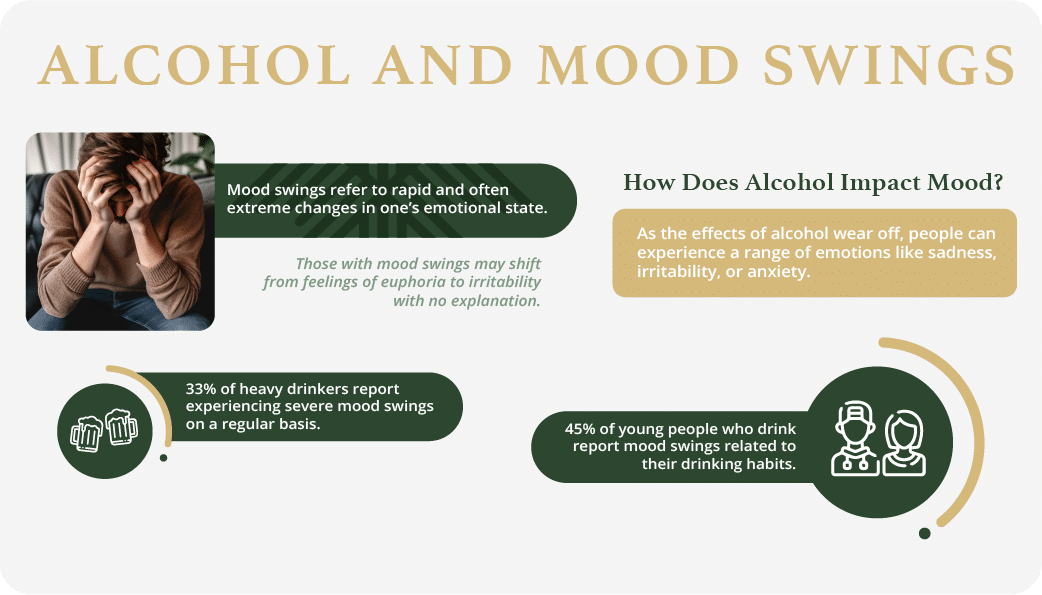You’re finally sober, but why are your moods still all over the place? One moment you’re filled with happiness and hope, and the next, you’re overwhelmed by irritability and anxiety. Don’t worry; these unpredictable emotions you are encountering are normal and will level out over time. But in the meantime, how do you handle these mood changes without picking up a drink? Understanding the connection between alcohol abuse and your mood is key.
Let’s explore how alcohol affects your emotions in both the short and long term, discover strategies to help you stabilize your mood during your journey to sobriety, and consider whether there might be an underlying mood disorder at play. Remember, you’ve got the strength to endure this. Stay resilient, keep your focus on the ultimate goal of long-term sobriety, and achieve the prize of emotional balance.
Mood Swings in Early Sobriety
In early sobriety, it’s common for your moods to resemble a rollercoaster ride, with ups and downs that can be both bewildering and challenging. Alcohol and mood swings often go hand in hand, and these mood swings are a typical part of the recovery journey. Understanding why they occur can help you navigate through this tumultuous period.

When you stop using drugs or alcohol, your body and mind need time to adapt to the absence of these substances. Withdrawal symptoms can be physically uncomfortable and emotionally distressing. Common withdrawal symptoms include anxiety, irritability, depression, insomnia, and even physical discomfort like headaches and nausea. These symptoms can contribute to mood swings as you grapple with the discomfort of withdrawal.
Substance abuse often disrupts the delicate balance of neurotransmitters in the brain that regulate mood. When you begin your recovery, your brain needs time to recalibrate and restore this balance. This can result in mood swings as your brain chemistry gradually normalizes.
Recovery is a transformative process, but it’s also emotionally demanding. You may be coming to terms with the consequences of your addiction, dealing with guilt and regret, and facing the challenges of rebuilding your life without relying on drugs or alcohol. These emotional burdens can lead to fluctuations in mood, with moments of hope and optimism juxtaposed with periods of anxiety and sadness.
For many individuals, substance use serves as a way to cope with stress, anxiety, or other emotional difficulties. As you abstain from these substances, you may be searching for new, healthier coping strategies. This transition can be frustrating and may result in mood swings as you learn to manage emotions without relying on substances.
Early sobriety often entails changes in your social circle and daily environment. Relationships may evolve, and you may need to find alternative ways to spend your time. These adjustments can be stressful and may contribute to mood swings as you adapt to these new circumstances.
Remember that early sobriety is a crucial phase in your journey toward a healthier and more fulfilling life. By understanding the factors contributing to your mood swings and seeking appropriate support, you can better navigate this challenging but ultimately rewarding period of recovery.
How Alcohol Affects Your Mood in the Short-Term
 In the short term, alcohol can have a significant impact on your mood, but it’s essential to understand that these effects are often short-lived and come with potential consequences. Here’s a closer look at how alcohol affects your mood in the short term:
In the short term, alcohol can have a significant impact on your mood, but it’s essential to understand that these effects are often short-lived and come with potential consequences. Here’s a closer look at how alcohol affects your mood in the short term:
- Depressant Effect: Alcohol acts as a depressant, slowing down activity in your brain and central nervous system. This can lead to immediate sensations of drowsiness or lightheadedness.
- Dopamine Release: Alcohol triggers the release of dopamine in your brain, often referred to as the “feel-good” hormone. This surge of dopamine can create a temporary boost in your mood and may temporarily alleviate feelings of anxiety or stress.
- Dopamine Crash: However, once the effects of alcohol wear off and it leaves your system, dopamine levels drop sharply. This abrupt decline in dopamine can lead to feelings of depression, irritability, and a general sense of emotional low.
- Binge Drinking Impact: Binge drinking, defined as consuming 4-5 drinks in 2 hours for women or 5-6 drinks for men, can severely impact your mood and mental state. During a binge, you may experience extreme fluctuations in emotion, going from states of excitement and euphoria to episodes of anger, depression, or withdrawal. These rapid and intense mood swings can have detrimental psychological effects.
In the end, any positive effects that alcohol has on your mood are only temporary. The highs are always followed by the lows, which can be mentally and emotionally draining, leaving you depleted and unstable. Seek healthier ways to boost your mood that don’t result in a crash.
Can Long-Term Alcohol Use Lead to Chronic Mood Disorders?
Long-term alcohol use takes a major toll on your mental health and mood. Over time, chronic alcohol abuse can lead to various mood disorders, including depression, anxiety, and other mental health issues.
Years of heavy drinking often result in depression. Initially, alcohol may act as a depressant, offering a sense of relaxation by slowing down brain activity. However, with prolonged abuse, your brain adapts to the constant presence of alcohol and reduces the production of neurotransmitters responsible for positive feelings. This can lead to persistent feelings of depression, even when you’re not drinking.
Excessive alcohol use can worsen anxiety and stress. While drinking might temporarily alleviate anxiety, it often leads to rebound anxiety and panic attacks as the alcohol exits your system. Chronic anxiety and worry are common among individuals with alcohol use disorders. Even after achieving sobriety, anxiety may persist, as your brain needs time to heal and restore its natural balance.
Long-term alcohol abuse has also been associated with conditions such as bipolar disorder, post-traumatic stress disorder (PTSD), obsessive-compulsive disorder (OCD), and various personality disorders. Prolonged heavy drinking, coupled with a genetic predisposition, can trigger or exacerbate these underlying mental health conditions. The good news is that many of these mood changes are reversible with sobriety and appropriate treatment. However, the longer and more intense the alcohol abuse, the longer it can take for your brain and moods to fully recover.
Recognizing the impact of long-term alcohol use on your mental health underscores the importance of seeking help and support for alcohol-related issues. Sobriety, combined with proper treatment, can significantly improve your mental well-being and overall quality of life.
Techniques to Manage Mood Swings During Recovery
Managing the interplay between alcohol and mood swings during recovery can be a significant challenge. However, there are several highly effective techniques and strategies available to help you maintain emotional stability and achieve long-term sobriety.
- Practice self-care. Prioritize self-care by staying hydrated, eating balanced meals, getting sufficient sleep, and engaging in regular exercise. Your physical health directly influences your mood and overall mental well-being.
- Connect with others. Reach out to a friend, or family member, or attend a support group meeting. Social interaction and bonding with individuals who understand your experience can provide valuable emotional support and help improve your mood.
- Engage in relaxing activities. Incorporate relaxing activities into your daily routine. Consider gentle exercises like yoga or walking, immerse yourself in a good book, pursue a hobby you’re passionate about, or spend time in nature. These calming distractions can shift your mood and alleviate anxiety or restlessness.
- Challenge negative thoughts. Pay attention to negative thoughts about yourself, your sobriety, or your life, and make an effort to challenge them with more positive and realistic thoughts. Your perspective has a significant impact on your mood and emotional well-being.
- Give yourself space. When you experience anger, irritability, or distress, allow yourself some space to let those emotions pass. Take a walk, practice deep breathing, or engage in activities that grant you perspective. As you continue on your path to sobriety, your emotional balance will gradually improve as your body and mind adapt to the changes.
Managing mood swings is an ongoing journey, and experiencing occasional fluctuations is normal. By incorporating these strategies into your daily life, you can maintain emotional stability on your path to long-term sobriety. For persistent mood swings, seek professional guidance to achieve emotional balance in your recovery.
What are the Treatment Options for Alcohol Abuse and Mood Swings?

Treatment for alcohol abuse and co-occurring mood swings typically involves a comprehensive approach that addresses both the addiction and the mood-related issues. It’s essential to consult with a healthcare professional to determine the most appropriate and effective treatment plan.
- Medical detox: Under medical supervision, it aids in handling withdrawal symptoms and lessening the intensity of mood swings.
- Inpatient treatment or outpatient treatment: Depending on severity, individuals can choose structured inpatient or flexible outpatient programs.
- Addiction therapy services: Cognitive-behavioral therapy (CBT), dialectical behavior therapy (DBT), and motivational enhancement therapy help manage triggers and develop healthier coping strategies.
- Medication: For co-occurring mood disorders, antidepressants, mood stabilizers, or anti-anxiety medications may be prescribed.
- Support Groups: Groups like Alcoholics Anonymous offer peer support and a safe space for sharing experiences.
- Dual diagnosis treatment: Addressing both addiction and mental health conditions simultaneously.
- Continuing Care: Ongoing support through outpatient therapy, support groups, and therapist check-ins.
- Holistic Approaches: Techniques like mindfulness, meditation, and yoga promote emotional balance and well-being.
Receive Alcoholism Treatment at Eagle Creek Ranch
If you or someone you care about is grappling with alcoholism, start your journey to recovery today. Eagle Creek Ranch Recovery in Nampa and Boise, Idaho offers comprehensive programs that equip you with the support and resources for substance abuse to conquer this difficult condition. Our dedicated team of professionals is ready to guide you on the path to sobriety, helping you regain control of your life and well-being. Don’t wait; reach out to us now and embark on a journey toward a healthier, happier, and alcohol-free future. Your recovery starts here at Eagle Creek Ranch.

Clinical Director
Kendall Maloof is the clinical director at Eagle Creek Ranch Recovery. She is a licensed marriage and family therapist and has held multiple leadership roles before settling here at Eagle Creek. Kendall received her master’s degree in marriage and family therapy from the Chicago School of Professional Psychology in 2016. Her career in mental and behavioral health began in 2014 when she took up internships in both the nonprofit and for profit sectors. She interned at multiple reputable companies, such as The Living Success Center and 449 Recovery in California.
In 2019, Kendall became the clinical director of Sunsets Recovery for Woman, a dual diagnosis program in southern California. Kendall is a natural leader. She has an incredible ability to problem solve and stay calm in any situation. Kendall never fails to show up when she is needed, and her calm demeanor makes her team and clients feel at ease. Eagle Creek Ranch Recovery is proud to have Kendall as our clinical director.



